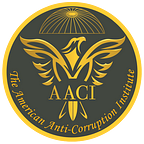Episode 14: Why does a national anti-corruption strategy fail?
Technical staff,
April 29, 2024
Welcome to “The Edge: Anti-Corruption” podcast series, brought to you by The American Anti-Corruption Institute (AACI). Our podcasts are designed to empower leaders and management within organizations to tackle fraud and corruption head-on. Today is April 29, 2024, and we’re delving into the major reasons underlying the failure of a national anti-corruption strategy.
A national anti-corruption strategy can fail for several reasons:
- Lack of political will: When political leaders are not committed to combating corruption, anti-corruption efforts may be hindered or even sabotaged.
- Insufficient resources: Anti-corruption agencies may not have sufficient funding, personnel, or technology to effectively investigate and prosecute corruption cases.
- Corruption within the anti-corruption agency: If the agency tasked with combating corruption is itself corrupt, it can undermine the effectiveness of the anti-corruption strategy.
- Lack of transparency and accountability: Without transparency and accountability, it can be difficult to track the flow of funds, identify corrupt activities, and hold individuals accountable for their actions.
- Inadequate legal framework: Weak or outdated laws and regulations can make it difficult to prosecute corruption cases or prevent corrupt activities from occurring in the first place.
- Corruption in the judiciary: If the judiciary is corrupt, it can be difficult to ensure that corrupt individuals are held accountable for their actions.
- Lack of public engagement: Anti-corruption efforts may not be effective if the public is not engaged and does not feel empowered to report corruption or participate in the anti-corruption process.
- Inadequate international cooperation: Corruption is often a transnational issue, and anti-corruption efforts may be hindered if countries do not cooperate with each other to combat corruption.
- Corruption in the private sector: Corruption can occur in the private sector, and anti-corruption efforts may be ineffective if they do not address corruption in this area.
- Inadequate training and capacity building: Anti-corruption agencies may not have the necessary training and capacity to effectively investigate and prosecute corruption cases.
- Corruption in the media: If the media is corrupt or biased, it can undermine anti-corruption efforts by failing to report on corruption or presenting biased information.
- Lack of whistleblower protection: Without adequate whistleblower protection, individuals who report corruption may face retaliation or other forms of persecution, which can discourage others from coming forward.
- Inadequate monitoring and evaluation: Anti-corruption efforts may not be effective if they are not adequately monitored and evaluated, making it difficult to identify areas for improvement.
Thank you for joining us on today’s episode. We encourage you to explore our earlier episodes for more insights into combating fraud and corruption. Please share this episode with all stakeholders to support the national anti-corruption efforts. Together, we can make a difference.
